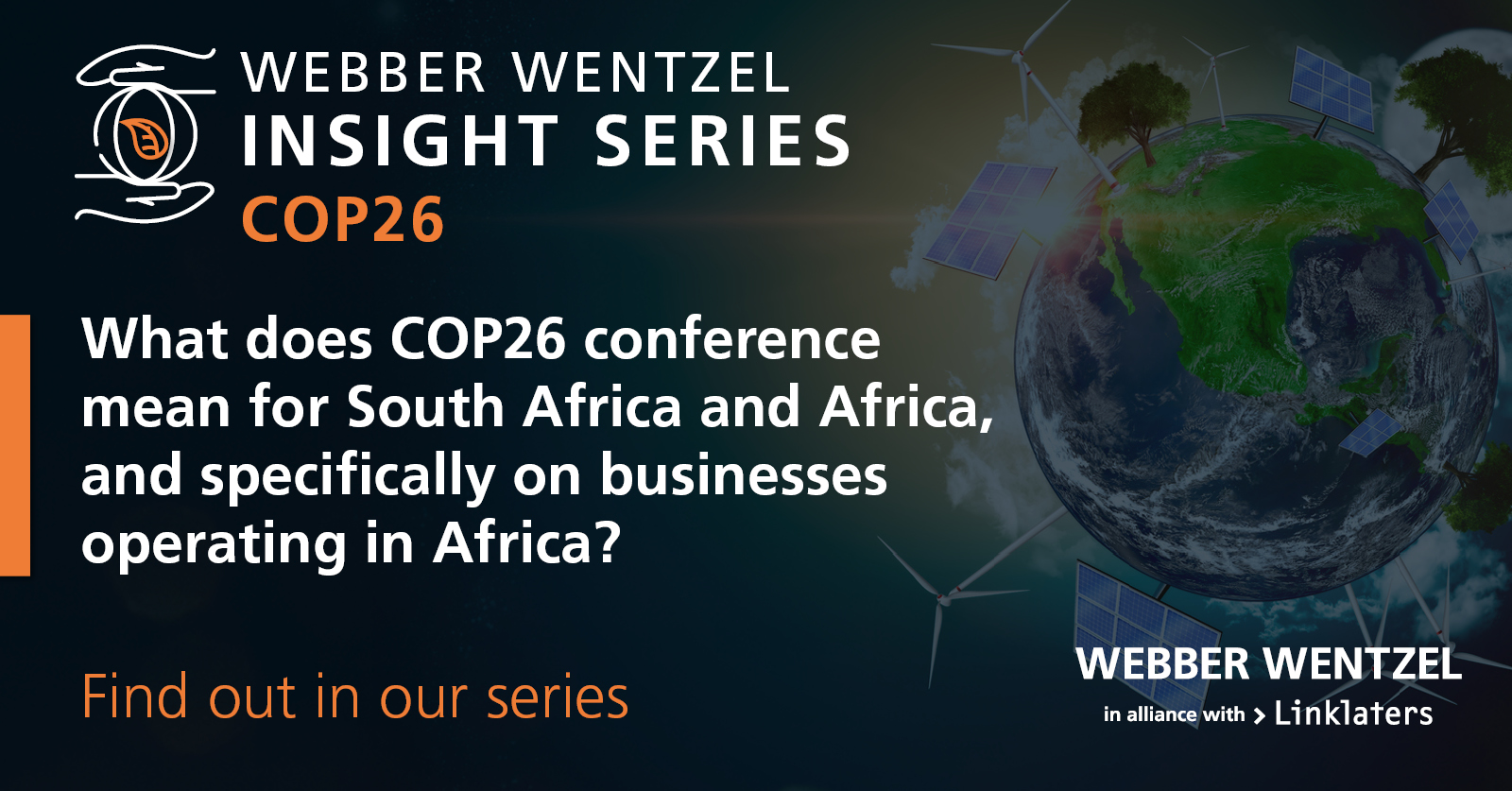
COP26 will attract more attention than previous COP meetings, as the destructiveness of global warming becomes increasingly evident
COP26, which takes place in Glasgow this year from 31 October to 12 November, is expected to motivate governments of all member states to put stricter legislation in place to control greenhouse gas (GHG) emissions.
In a series of articles leading up to and accompanying the COP26 conference, Webber Wentzel will be focusing on what the conference means for South Africa and Africa and, specifically on businesses operating in Africa.
This year’s event will attract more interest than usual after the publication of a report by the Intergovernmental Panel on Climate Change (IPCC) on 9 August 2021 warning that global warming is "widespread, rapid and intensifying" and unequivocally the result of human activity. UN secretary-general Antonio Guterres described this report as "code red" for humanity.
COP26 is the 26th meeting of the Conference of the Parties that have signed up to the United Nations Framework Convention on Climate Change. South Africa is one of the signatories to the Paris Agreement signed at COP21 in 2015, when 196 countries agreed to set Nationally Determined Contributions (NDCs). NDCs commit each country to reducing its contribution to global GHG emissions to help contain the increase in global temperatures to below 2⁰C above pre-industrial levels.
NDCs must be updated every five years, and this year more ambitious NDCs will be expected from governments. The IPCC report warned that the goals of the Paris Agreement signed in 2015 would be missed without deep and rapid cuts to GHG emissions.
South Africa's 2015 commitment was to hold its GHG emissions to between 398 and 614 Mt of CO₂ equivalent by 2025 and 2030. In March 2021, it revised that commitment to 398 - 440 Mt of CO₂ equivalent by 2030.
The latest IPCC report predicts that the world will see a 1.5⁰C increase in temperatures by 2040, even with deep reductions in emissions. If temperatures rise even further, by 2⁰C, life on earth will become much tougher and there will be damage that will be very hard or very costly to reverse.
Already global temperatures have risen about 1.1⁰C. They are expected to increase by 2.7⁰C by the end of the century, unless drastic action is taken. The Centre for Environmental Rights in South Africa recently published two reports highlighting the stark impacts that climate change is expected to have in Southern Africa if immediate action is not taken including reduced agricultural production and freshwater resources, as well as the risk of severe storms causing large-scale loss of life and infrastructure and the premature extinction of thousands of African species. These reports can be accessed
here.
This is why there is discussion about at least halving emissions by 2030 and reaching net zero by 2050. The current decade is seen as “make or break” for climate action.
The COP main agenda can be accessed
here and there will be simultaneous fringe events that are open to the public, including the COP26 “Green Zone”. The Green Zone agenda can be accessed
here.
Read COP26 Insight Series articles
At the United Nations climate change conference in Paris (COP21), governments agreed that mobilising stronger and more ambitious climate action is urgently required to achieve the goals of the Paris Agreement.
Ahead of COP26 later this month, South Africa's commitment to the Just Transition will be a crucial element of its negotiating position.
South Africa was the first country in the world to grant the tax concession in Section 37D of the Income Tax Act to protect biodiversity, which provides a sustainable financing solution.
Innovative funding for sustainability projects is spurring legal firms like Webber Wentzel to innovate also in the loan agreements that they are drafting for clients.
Legislative reforms are making South Africa’s energy sector greener and more competitive, which will encourage economic growth and help the country meet its climate change commitments.
The South African government has set a number of priorities to transform the country’s energy sector and prepare a climate change response to achieve the just transition.
In this videocast, an esteemed panel of experts, hosted by Webber Wentzel’s Jason van der Poel, share insights on Africa’s energy sector.
Existing and new technologies will be critical to mitigate and manage the damage of global warming.
Creating sustainable and environmentally-friendly cities is a central feature of climate change adaptation, embracing themes such as AI, IP law and post-mining economies.
The South African government needs to put appropriate funding and policies in place to ensure its transport sector, including shipping, adapts to zero-carbon fuels.
Various Outcome Statements were published after the two-week COP 26 conference. They make it clear that both mitigation and adaptation efforts need to intensify, in global partnership.
Listen to COP26 Insight Series interviews